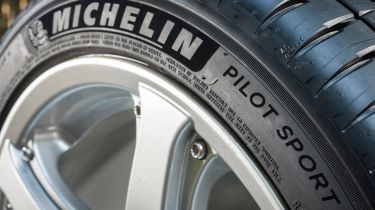EU introduces new tyre rules potentially saving consumers £5.9 billion a year
The EU is introducing a regulation that requires used tyres perform as well as new tyres in wet-weather braking tests

- New tyres must meet the same performance standards when worn to minimum tread
- Aims to increase confidence in used tyres
- Could save up to 400 million tyres a year and consumers £5.9 billion
The EU has just introduced a regulation mandating that all tyres worn down to the minimum legal tread depth of 1.6mm must now meet the same performance standards as when they’re brand new in wet-weather braking tests.
Previously the standards only applied to brand new tyres at full tread depth, but the regulation has been brought in not only to improve safety, but also to cut down on the amount of tyres that are thrown away or recycled when they are still perfectly usable.
What does this mean for motorists?
The new regulation should increase consumer confidence in keeping the same tyres fitted for longer, as they will be reassured they’re just as safe to use when worn as when they’re new. With tyres effectively gaining a longer life, consumers will be able to save money safely in the knowledge that they’re taking less of a risk doing so.
It remains to be seen whether the improvements in tyre performance will result in higher costs for consumers, but a report from May 2017 by Ernst & Young suggests that being able to keep tyres longer could save consumers 7 billion euros (£5.9 billion) per year.
A decision has yet to be made as to whether the UK will introduce the new regulation here, but British officials were involved in drafting up the mandate before it was adopted by the EU. It’s unlikely that tyres sold in the UK will end up differing from those sold in the EU in any case, so long as the four-digit age code on the tyre shows it as having been newly manufactured.
What are the benefits to the environment?
Tyre giant Michelin estimates that around 50% of tyres are scrapped and replaced before they’ve got down to 3mm of tread depth, which is well above the legal minimum of 1.6mm in Europe and the UK.
Michelin also estimates that the new regulation could decrease tyre consumption across Europe by a staggering 128 million units, reducing CO2 emissions by 6.6 million tonnes. If the same regulations were rolled out around the entire world, then there would be 400 million fewer tyres fitted annually, reducing CO2 by 35 million tonnes – the same amount of CO2 produced by the city of New York in six months.
To make sure your tyres are still in a roadworthy condition, read our guide to tyre tread depths...
Recommended
Most Popular

New Smart #5 Brabus is a 637bhp far cry from the brand’s city car past

Best car leasing deals 2025: this week’s top PCH offers
Tips & advice

Car dashboard warning lights: what does each symbol mean?

Electric car charging stations: public networks, charger types, apps and maps








